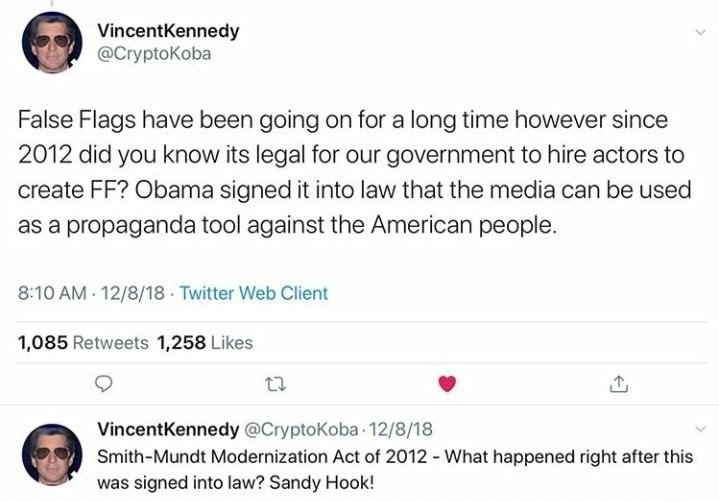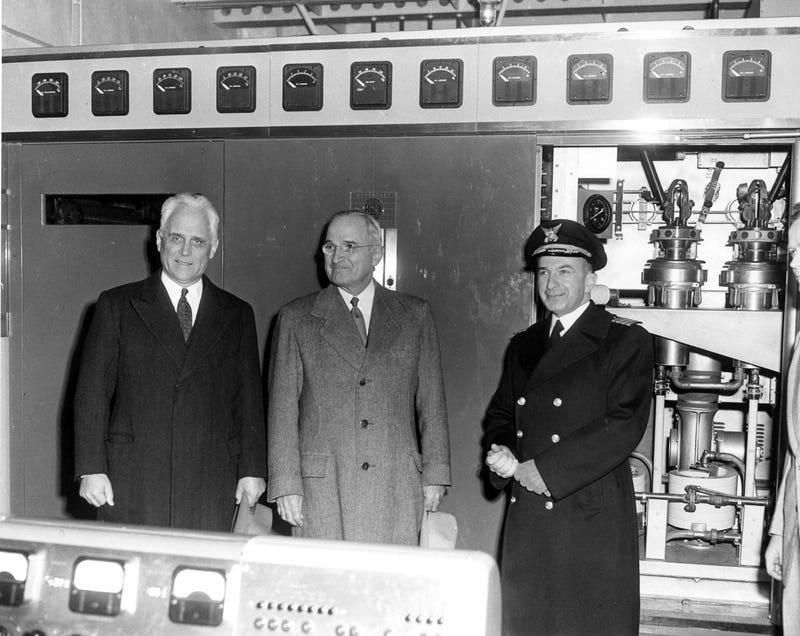Everything You Need to Know to Repeal Obama’s Propaganda Poison & Save Our 1st Amendment
Trump’s Charlie Kirk Act - be sure to take the appropriate steps in the Call to Action section!
Our note: this post is heavily resources with links provided, as noted by the square brackets…
by L Richardson, Critical Thinking Dispatch (excerpt)
In 1948, the Smith-Mundt Act established critical safeguards for the Charlie Kirk Act to restore today.
For decades, this legislation protected Americans by prohibiting government-produced media from targeting US citizens themselves[12].
However, in 2012, everything changed when the Smith-Mundt Modernization Act made it legal for government-produced propaganda to be directed toward US citizens[12], effectively dismantling protections that had been in place since 1948.
We witnessed a troubling shift in 2013 when President Obama signed the National Defense Authorization Act, which authorized the use of propaganda inside the United States[13].
This dramatic change reversed a ban that had been in place for over 6 decades.
Previously, an outdated US law adopted after World War II had prevented Americans from listening to broadcasts on the Voice of America and other taxpayer-supported broadcasters. [14]
Yet rather than simply modernizing access, the 2013 changes opened floodgates to domestic propaganda concerns.
As a result, Congress has steadily reduced the budget for international broadcasting from $844 million in FY 1993 to a proposed $560 million for FY 2004[15], while simultaneously enabling domestic targeting.
The 1999 reorganization that placed the previously independent USIA within the US Department of State has not effectively addressed these challenges[15], making the Charlie Kirk Act’s mission to restore proper boundaries between government messaging and First Amendment freedoms more urgent than ever.
The Smith-Mundt Shield: A Constitutional Fortress Forged in 1948
Image Source: Cold War Radio Museum
President Harry S. Truman’s signature on January 27, 1948, established a constitutional shield that would protect Americans for decades.
The US Information and Educational Exchange Act of 1948, known commonly as the Smith-Mundt Act, created essential safeguards against government propaganda that the Charlie Kirk Act now seeks to restore[16].
The Smith-Mundt Act emerged during the early Cold War confrontation with Soviet Communism.
Named after its sponsors, Senator H. Alexander Smith (R-NJ) and Representative Karl E. Mundt (R-SD), this legislation was explicitly designed to authorize American values promotion abroad through various information channels[15].
The bill, initially introduced in 1947, created what would eventually become the International Communication Agency, later known as the United States Information Agency (USIA)[17].
Congress declared unequivocally that “truth can be a powerful weapon” against communist propaganda[18].
The legislation authorized 6 crucial principles that demonstrated America’s commitment to honest communication:
Tell the truth
Explain the United States’ motives
Bolster morale and extend hope
Present an accurate picture of American life
Combat misrepresentation and distortion
Aggressively support American foreign policy[18]
The Act empowered the State Department to communicate internationally through broadcasting, face-to-face contacts, educational exchanges, and various media publications[18].
Voice of America (VOA), which had begun broadcasting in 1942, became a cornerstone of this effort[17].
Furthermore, the legislation supported films, publications, and cultural exchanges designed to showcase American exceptionalism to international audiences.
Most critically, Smith-Mundt specifically prohibited domestic distribution of materials intended for foreign audiences[16].
This restriction wasn’t accidental - it represented a deliberate constitutional firewall protecting Americans from their own government’s persuasion efforts.
The legislation established that these communications should “not be disseminated within the United States, its territories, or possessions” [19].
This protection was profoundly intentional.
Congress would never have approved funding for VOA in 1948 if its programs were to be broadcast domestically[16].
Their concerns stemmed from both fears of Soviet-influenced domestic propaganda and the determination to prevent government competition with private American media[16].
Representative Howard H. Buffett, father of investor Warren Buffett, specifically raised concerns about potential domestic propaganda activities[16].
The Smith-Mundt Act served multiple constitutional purposes, safeguarding American liberty.
Fundamentally, it ensured that government-funded information campaigns remained exclusively foreign-focused, protecting domestic discourse from taxpayer-funded influence operations[19].
The legislation created 3 key restrictions that protected constitutional sovereignty:
Prevented domestic distribution of foreign-targeted materials—ensuring Congress, media, and academia would filter what Americans learned about State Department messaging overseas[18]
Required supplementing private agencies—not replacing them—thereby preventing government from monopolizing information channels[18]
Mandated private sector oversight by requiring industry leaders to review and advise State Department activities[18]
These protections upheld essential libertarian principles by preventing government from competing with private media or monopolizing information sources[16].
The Act explicitly prohibited the State Department from acquiring “a monopoly of broadcasting or any other information medium” [18].
This limitation embodied the constitutional commitment to free markets and free speech - recognizing that government-controlled information threatens both.
Additionally, the protections shielded organic consensus formation among Americans.
By preventing domestic propaganda campaigns, Smith-Mundt ensured that public opinion would develop naturally, rather than through taxpayer-funded persuasion efforts. [19]
According to the Heritage Foundation, these safeguards were essential components of true public diplomacy that distinguished America from authoritarian regimes[15].
Without these protections, America risked engaging in the same domestic propaganda activities it criticized in communist nations.
The legislation established a foundational principle: Americans should not fund propaganda aimed at themselves.
This restriction demonstrated respect for taxpayers and acknowledged the dangers of government-controlled messaging[1].
Nebraska Senator Edward Zorinsky later strengthened this principle, arguing that domestic propaganda restrictions distinguished America “from the Soviet Union, where domestic propaganda is a principal government activity” [1].
The Smith-Mundt Act created what the Heritage Foundation identified as necessary “obsolete restrictions” that actually served vital constitutional purposes[19].
Despite critics dismissing these protections as outdated, they preserved essential boundaries between government messaging and a free society.
The Act’s protections recognized a fundamental truth: government-controlled information represents a threat to liberty that requires constant vigilance.
As the Heritage Foundation noted, these restrictions prevented the government from using “all available tools of engagement” domestically—a limitation that protected constitutional freedoms[19].
This legislation represented a constitutional fortress defending Americans from their own government’s persuasive capabilities.
Even as it authorized promotion of American values abroad, it erected protective barriers ensuring those same techniques couldn’t be turned against American citizens—barriers the Charlie Kirk Act now seeks to reinstate after Obama dismantles these protections.
Obama’s Betrayal: Unleashing Propaganda Poison in 2012
Be sure to take the appropriate steps in the Call to Action Section of the Critical Thinking Dispatch post linked to the button just above…
Key Takeaways
The Charlie Kirk Act represents a critical legislative response to restore constitutional protections against government propaganda that were dismantled in 2012, sparked by the tragic assassination of conservative leader Charlie Kirk.
Obama’s 2012 Smith-Mundt Modernization Act eliminated crucial protections that had banned domestic government propaganda since 1948, opening floodgates for taxpayer-funded psychological operations targeting American citizens.
The original 1948 Smith-Mundt Act created essential constitutional firewalls preventing government from competing with private media and manipulating domestic public opinion—protections that distinguished America from authoritarian regimes.
Charlie Kirk’s September 2025 assassination catalyzed nationwide patriot mobilization, with Trump’s viral Truth Social post garnering 147M views and Senator Mike Lee pledging immediate legislation to restore media accountability.
The proposed Charlie Kirk Act would completely repeal Obama’s 2012 changes while adding modern penalties for social media censorship and unverified character assassination that endanger lives.
Grassroots momentum is building rapidly with over 5,000 petition signatures, #CharlieKirkAct trending with 7,873+ reposts, and bipartisan recognition that domestic propaganda threatens constitutional liberty and national unity.
The legislation represents more than policy reform—it embodies a recommitment to fundamental constitutional principles that separate America from tyrannical governments that use propaganda against their own citizens.
FAQs
Q1. What was the Smith-Mundt Act, and why was it important?
The Smith-Mundt Act of 1948 prohibited the domestic dissemination of government-produced media intended for foreign audiences. It established essential safeguards to protect Americans from their own government’s propaganda efforts. It upheld the principles of free speech and the press.
Q2. How did the 2012 Smith-Mundt Modernization Act change things?
The 2012 Act removed the longstanding ban on domestic dissemination of government-produced content created initially for foreign audiences. This allowed materials from the State Department and Broadcasting Board of Governors to be distributed within the US, raising concerns about government influence on public opinion.
Q3. What is the proposed Charlie Kirk Act?
The Charlie Kirk Act is proposed legislation that aims to repeal the 2012 Smith-Mundt Modernization Act and reinstate protections against domestic government propaganda. It would restore the original ban on disseminating government-produced foreign content domestically and add new penalties for social media censorship and unverified smears.
Q4. Why do supporters say the Charlie Kirk Act is necessary?
Supporters argue the Act is needed to protect constitutional liberties, prevent government manipulation of public discourse, and restore clear boundaries between government messaging and free speech. They believe removing propaganda restrictions has fueled division and threatens the foundations of a free society.
Q5. How has the public response been to the proposed Charlie Kirk Act?
The Act has gained significant traction, with a Change.org petition garnering over 5,000 signatures in a short period. Social media engagement has been high, with related hashtags trending and posts by political figures receiving millions of views. Both nationalist and libertarian groups have expressed support for the legislation.
References are listed at the end of the Critical Thinking Dispatch post…




